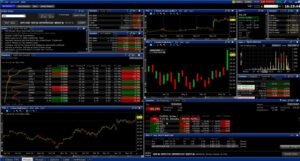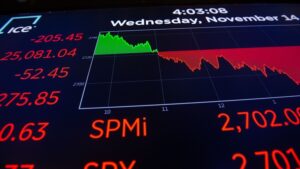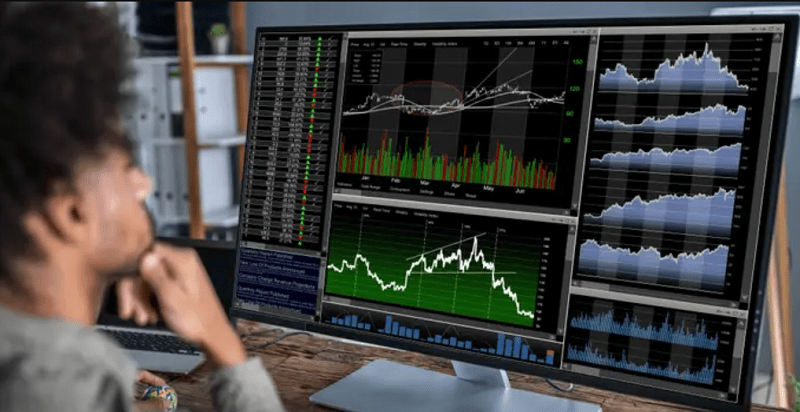Investment Education for Trading
Speculation Schooling for Exchanging
Putting and exchanging monetary business sectors can be both elating and threatening. With the right instruction, in any case, anybody can explore these waters certainly. This guide intends to give an exhaustive comprehension of the fundamental ideas, methodologies, and mental viewpoints essential for fruitful exchanging.

Kinds of Business sectors
The monetary business sectors are different, offering different open doors for speculation and exchange. The fundamental kinds include
Securities Exchange: Where portions of public corporations are traded.
Forex Market: The biggest monetary market, where monetary standards are exchanged.
Items Market: Exchanging of unrefined components like gold, oil, and rural items.
Cryptographic money Market: Computerized or virtual monetary standards like Bitcoin and Ethereum.
Security Market: Where obligation protections are exchanged, including government and corporate securities.
Monetary Instruments
Different monetary instruments take care of different exchange and speculation systems:
Stocks: Address possession in an organization and a case on a piece of its benefits.
Bonds: Obligation protections given by elements to raise capital, promising to repay with interest. Venture supports exchanges on stock trades, holding resources like stocks, products, or bonds.
Common Assets: Speculation programs subsidized by investors that exchange expanded property.
Choices and Prospects: Subsidiaries permit exchanging given the cost of a fundamental resource.
Cryptographic forms of money: Computerized resources using blockchain innovation for secure exchanges.
Understanding request types is essential for viable exchanging:
Market Request: Executes quickly at the ongoing business sector cost.
Limit Request: Executes at a predefined cost or better.
Stop-Misfortune Request: Sells a security when it arrives at a foreordained cost, restricting misfortunes.
Following Stop Request: Like a stop misfortune however moves with the cost of the security.
Market Members
The market comprises different members, each assuming a part in its elements.
Retail Merchants: Individual financial backers exchanging with individual records.
Institutional Financial backers: Substances like common assets, benefits assets, and insurance agencies overseeing huge portfolios.
Market Producers: Firms giving liquidity by being prepared to trade protections whenever.
Representatives: Delegates working with exchanges among purchasers and merchants.

Essential Investigation
The essential investigation includes assessing a security’s inborn worth by inspecting related monetary, monetary, and other subjective and quantitative variables.
Budget summaries
Understanding budget summaries is vital to principal examination.
Monetary record: Shows an organization’s resources, liabilities, and value at a particular moment.
Pay Explanation: Reports an organization’s income, costs, and benefits over a period.
Income Articulation: Gives an outline of money inflows and surges from working financial planning, and funding exercises.
Proportions and Measurements
Key monetary proportions and measurements help in assessing an organization’s presentation:
P/E Proportion (Cost to Income): Shows how much financial backers will pay per dollar of income.
Stake Proportion (Value/Income to Development): Thinks about an organization’s P/E proportion comparative with its income development rate.
P/B Proportion (Cost to Book): Looks at an organization’s fairly estimated worth to its book esteem.
Profit Yield: Shows the profit pay per share comparative with the offer cost.
ROE (Return on Value): Measures benefit comparative with investors’ value.
Financial Pointers
Observing monetary pointers can give bits of knowledge into economic situations.
Gross domestic product (GDP): Complete worth of labor and products created, showing financial well-being.
Joblessness Rates: High rates can flag financial difficulty, while low rates demonstrate monetary strength.
Expansion Rates: Proportion of cost increments, impacting buying power and money-related strategy.
Loan fees: Influence acquiring expenses and shopper spending.
Financial Schedules: Track planned arrivals of monetary information and occasions.
Industry Examination
Assessing the presentation and possibilities of various areas and ventures recognizes amazing open doors and dangers.
Area Execution: Various areas (e.g., innovation, medical care, finance) perform contrastingly under fluctuating monetary circumstances.
Serious Scene: Breaking down rivalry inside an industry.
Administrative Climate: Understanding guidelines influencing explicit businesses.
Specialized Investigation
Specialized investigation includes dissecting value developments and exchanging volumes to conjecture future cost patterns.
Outlines and Diagrams
Dealers utilize different graphs to imagine cost developments:
Line Diagrams: The basic portrayal of shutting costs after some time.
Bar Diagrams: Show open, high, low, and close costs for each period.
Candle Graphs: Like bar outlines yet outwardly more enlightening, demonstrating value course and strength.

Markers and Oscillators
Specialized markers and oscillators assist with recognizing patterns and potential inversion focuses:
Moving Midpoints: Smooth out value information to distinguish patterns.
RSI (Relative Strength List): Measures the speed and change of cost developments, demonstrating overbought or oversold conditions.
Bollinger Groups: Show cost unpredictability by plotting standard deviations above and under a moving normal.
Fibonacci Retracement: Distinguishes potential inversion levels given the Fibonacci grouping.
Volume Investigation
Investigating exchanging volume affirms cost developments and foresees likely inversions:
Volume Spikes: areas of strength for demonstrating or selling interest.
Volume Patterns: Supported increments or diminishes in volume can flag pattern strength or shortcomings.
Exchanging Systems
Different exchanging systems take care of fluctuating gamble hunger and venture skylines:
Day Exchanging
Day exchanging includes trading inside a similar exchanging day, planning to benefit from momentary cost developments.
Swing Exchanging
Swing exchanging centers around catching increases from cost swings north of a few days or weeks.
Position Exchanging
Position exchanging includes standing firm on footings for broadened periods, from months to years, because of long-haul patterns.
Scalping
Scalping intends to create various little gains on little cost changes all through the exchanging day.
Risk The executives
Viable gamble the executives is urgent to long haul exchanging achievement:
Enhancement
Spreading ventures across different resources diminishes risk.
Position Estimating
Deciding the proper measure of capital for each exchange to oversee risk.
Risk/Prize Proportion
Thinking about possible dangers in contrast to expected prizes to go with informed exchanging choices.
Mental Perspectives
Exchanging brain research assumes a critical part in effective exchanging. Dealing with feelings like trepidation and insatiability is fundamental for trained exchanging. Adhering to exchanging plans and methodologies, paying little heed to economic situations.
Persistence
I am sitting tight for the right exchanging open doors instead of incautiously entering exchanges.
Strength
I am taking care of misfortunes and difficulties actually, gaining from botches without becoming deterred.
High-level Subjects
Utilizing mechanized frameworks and calculations to execute exchanges in light of predefined standards.
Choices and Prospects Understanding and exchanging subordinates to fence chances or hypothesize on cost developments. Influence and Edge Utilizing acquired assets to increment likely returns, grasping the related dangers.

Supporting Methodologies
Procedures to safeguard speculations against unfriendly market developments.
Online Courses and Instructional exercises
Coursera, Udemy, Khan Foundation, and Investopedia offer complete courses. Merchant stages like TD Ameritrade, E*TRADE, and Intuitive Dealers give instructive assets and online courses.
Exchanging Test systems
Work on exchanging with virtual cash on stages like Investopedia Stock Test system, TradingView, or paper exchanging accounts presented by merchants.
Monetary News and Investigation
Follow monetary news on Bloomberg, Reuters, CNBC, and the Monetary Times. Venture training for exchanging is a continuous excursion. By grasping the nuts and bolts, dominating essential and specialized examinations, creating viable exchange systems, overseeing risk, and sharpening mental strength, you can explore the monetary business sectors with certainty and ability. Use the plenty of instructive assets accessible to work on your insight and exchange execution persistently.
Venture Instruction for Exchanging
Adventure trading is the demonstration of exchanging money-related instruments like stocks, securities, items, or computerized monetary standards to achieve an advantage. It requires a significant perception of money-related business areas, an assessment of monetary components, and imperative readiness. This guide hopes to give serious areas of strength for to individuals roused by adventure trading by covering its key thoughts, different trading methods, chances included, and huge gadgets.
Figuring out Monetary Business sectors
The monetary market is where purchasers and dealers exchange resources like stocks, securities, monetary forms, and subordinates. These business sectors are critical for giving liquidity, permitting organizations to raise capital, and offering financial backers amazing open doors for abundance age.
Sorts of Dealers
Dealers can be extensively ordered into three kinds given their time skyline and exchanging style:
Informal investors: These dealers trade protections around the same time, profiting by transient cost developments. They depend vigorously on specialized examination and continuous information.
Swing Dealers: Swing merchants stand firm on footings for a few days to weeks, endeavoring to benefit from cost vacillations in a medium-term pattern.
Position Dealers: Position brokers clutch resources for months or years, depending more on basic examination and less on momentary cost changes. This methodology is nearer to effective money management than dynamic exchange.
Speculation Procedures
Various techniques can be utilized relying upon economic situations, risk resistance, and time responsibility.
Purchase and Hold: This is a drawn-out procedure where dealers put resources into protections and hold them for a lengthy period, ordinarily profiting from long-haul appreciation.
Esteem Effective financial planning: Made popular by Warren Buffett, this technique includes picking stocks that are underestimated compared with their natural worth.
Development Contributing: This technique centers around putting resources into organizations expected to become quicker than the market normal. These stocks may be more unpredictable yet can offer exceptional yields.
Force Exchanging: Merchants utilizing this procedure endeavor to benefit from the continuation of existing patterns in stock costs. They follow stocks that show up or descending force.
Scalping: This system includes making handfuls or many exchanges a solitary day, endeavoring to “scalp” little benefits from each exchange. A rapid exchange technique requires close checking of the market.
Specialized versus Essential Examination
Exchanging requires settling on informed conclusions about when to trade a resource, and dealers depend essentially on two kinds of investigation:
Specialized Investigation: This is the investigation of past market information, principally cost and volume, to gauge future cost developments. Specialized dealers use instruments like moving midpoints, trendlines, and energy markers to distinguish potential exchanging open doors.
Essential Examination: This technique centers around assessing an organization’s monetary well-being and more extensive financial elements, for example, income reports, income development, piece of the pie, and industry execution. Central merchants search for underestimated stocks and serious areas of strength for term development possibilities.
The two kinds of examination are helpful, and numerous brokers utilize a mix of both to simply decide.
Risk The executives
Exchanging consistently implies risk, and effective dealers execute techniques to limit likely misfortunes. Key gamble the executive’s strategies include:
Stop Misfortune Orders: A stop-misfortune request is set to sell a security on the off chance that it arrives at a specific cost, forestalling further misfortunes on the off chance that the market moves against a merchant’s situation.
Position Measuring: This includes deciding the perfect proportion of cash flow to allot to each exchange because of the dealer’s complete portfolio and change resilience. By controlling the size of each exchange, dealers can restrict openness to any single position.
Enhancement: As referenced previously, spreading ventures across various areas or resource classes can decrease the gamble of any one exchange unfavorably influencing the portfolio.
Risk/Prize Proportion: Dealers frequently set a foreordained proportion to quantify the potential benefit compared with the misfortune they will acknowledge. For instance, a 2:1 gamble/reward proportion implies a merchant will risk $1 to possibly procure $2.
Instruments and Stages for Exchanging
To prevail with regards to exchanging, people should dive more deeply into key apparatuses and stages. The main ones include:
Exchanging Stages: These are the points of interaction through which merchants submit their trade requests. Famous stages incorporate MetaTrader, Thinkorswim, and Robinhood. These stages offer different instruments, for example, graphing programming and constant information.
A financier goes about as a middle person among brokers and the monetary market. Dealers need to open a record with a financier firm to execute exchanges. Significant business firms incorporate TD Ameritrade, E*TRADE, and Devotion.
Graphing Programming: This product is utilized to break down cost developments and recognize designs. Many exchanging stages have underlying graphing capacities, yet a few dealers lean toward devoted programming like TradingView.
News channels: Market-moving news can fundamentally affect the costs of monetary instruments. Brokers frequently use news channels, such as Bloomberg or Reuters, to remain informed about monetary information discharges, organization profit, and international occasions.
Mental Variables in Exchanging
Progress in exchanging isn’t just about specialized abilities yet in addition about dominating the mental angles. Feelings like trepidation and voracity can prompt unreasonable choices. Here are a few critical mental elements to consider:
Merchants need to follow their techniques and not let feelings direct their activities. This implies adhering to stop-misfortune levels and not pursuing the market.
Now and again, the best exchange is no exchange. Merchants need to hang tight for the perfect times as opposed to constraining exchanges.
Flexibility: Markets are dynamic and eccentric. Merchants should be adaptable and change their techniques in light of economic situations.
Presumptuousness: Numerous merchants, particularly after a progression of effective exchanges, could foster pomposity, which can prompt facing unnecessary challenges.
Administrative Contemplations and Duties
Before beginning, merchants ought to know about the administrative climate in their country. For example, in the U.S., exchange exercises are directed by the Protection and Trade Commission (SEC) and the Monetary Business Administrative Power (FINRA). Consistency with these guidelines is vital to stay away from legitimate issues.
Moreover, brokers need to think about the expense ramifications of their exercises. In numerous nations, transient exchanges are charged at a higher rate than long-haul speculations. Counseling a duty counselor is fitting to figure out the expense ramifications of various exchanging procedures.
Venture exchange offers the potential for critical benefits, yet it additionally accompanies innate dangers. Fruitful exchanging requires a mix of information, technique, discipline, and the capacity to oversee risk. By figuring out monetary business sectors, embracing the right exchanging style, utilizing specialized and basic examination, and monitoring mental elements, hopeful brokers can work on their odds of coming out on top.
Exchanging is a nonstop educational experience, and remaining informed about market patterns, monetary circumstances, and new exchanging innovations is fundamental. With the right training and outlook, people can outfit the force of monetary business sectors to accomplish their monetary objectives.


